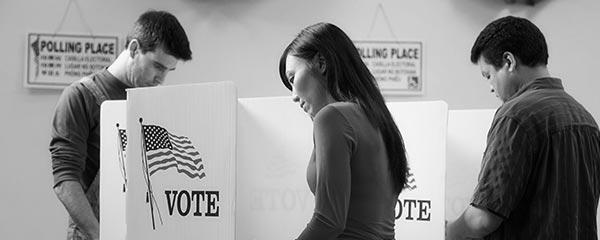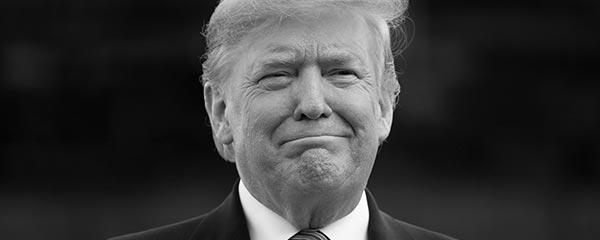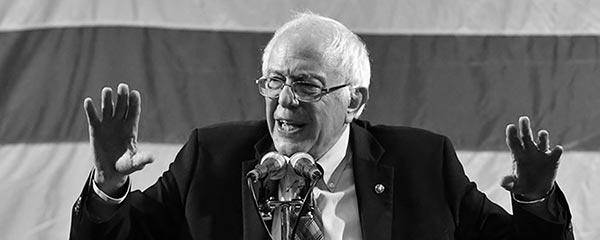Story Highlights
- About six in 10 adults feel more enthusiastic about voting this year than usual
- Thought given to campaign also on high side for February of election year
- Republicans have edge on enthusiasm; Democrats, on thought to campaign
WASHINGTON, D.C. -- Americans' engagement with the 2020 presidential election remains relatively high, as 59% of U.S. adults, similar to the 63% recorded in January, say they feel more enthusiastic than usual about voting in this year's election.
Today's level of enthusiasm is similar to the early days of the 2008 primary season, when 62% felt more enthusiastic as highly popular presidential candidates in both parties were seeking their party's nod. By contrast, 55% were more enthusiastic at a comparable point in 2004, while fewer than half were this keen in February 2012 (47%), May 2016 (46%) and March 2000 (37%).
Additionally, two-thirds say they have given "quite a lot" of thought to the election, on the high end for February of presidential election years, although shy of the record high from 2008.
| Early in election year^ | End of election year^ | Change | ||||||||||||||||||||||||||||||||||||||||||||||||||||||||||||||||||||||||||||||||||||||||||||||||||
|---|---|---|---|---|---|---|---|---|---|---|---|---|---|---|---|---|---|---|---|---|---|---|---|---|---|---|---|---|---|---|---|---|---|---|---|---|---|---|---|---|---|---|---|---|---|---|---|---|---|---|---|---|---|---|---|---|---|---|---|---|---|---|---|---|---|---|---|---|---|---|---|---|---|---|---|---|---|---|---|---|---|---|---|---|---|---|---|---|---|---|---|---|---|---|---|---|---|---|---|---|
| % | % | pct. pts. | ||||||||||||||||||||||||||||||||||||||||||||||||||||||||||||||||||||||||||||||||||||||||||||||||||
| % More enthusiastic about voting | ||||||||||||||||||||||||||||||||||||||||||||||||||||||||||||||||||||||||||||||||||||||||||||||||||||
| 2020 Feb 17-28 | 59 | -- | -- | |||||||||||||||||||||||||||||||||||||||||||||||||||||||||||||||||||||||||||||||||||||||||||||||||
| 2016 May 18-22 | 46 | 47 | +1 | |||||||||||||||||||||||||||||||||||||||||||||||||||||||||||||||||||||||||||||||||||||||||||||||||
| 2012 Feb 16-19 | 47 | 62 | +15 | |||||||||||||||||||||||||||||||||||||||||||||||||||||||||||||||||||||||||||||||||||||||||||||||||
| 2008 Feb 8-10 | 62 | 65 | +3 | |||||||||||||||||||||||||||||||||||||||||||||||||||||||||||||||||||||||||||||||||||||||||||||||||
| 2004 Jan 29-Feb 1 | 55 | 65 | +10 | |||||||||||||||||||||||||||||||||||||||||||||||||||||||||||||||||||||||||||||||||||||||||||||||||
| 2000 Mar 10-12 | 37 | n/a | n/a | |||||||||||||||||||||||||||||||||||||||||||||||||||||||||||||||||||||||||||||||||||||||||||||||||
| % Given quite a lot of thought to election | ||||||||||||||||||||||||||||||||||||||||||||||||||||||||||||||||||||||||||||||||||||||||||||||||||||
| 2020 Feb 16-29 | 67 | -- | -- | |||||||||||||||||||||||||||||||||||||||||||||||||||||||||||||||||||||||||||||||||||||||||||||||||
| 2016 Jan 21-25 | 63 | 77 | +14 | |||||||||||||||||||||||||||||||||||||||||||||||||||||||||||||||||||||||||||||||||||||||||||||||||
| 2012 Feb 16-19 | 61 | 78 | +17 | |||||||||||||||||||||||||||||||||||||||||||||||||||||||||||||||||||||||||||||||||||||||||||||||||
| 2008 Feb 21-24 | 72 | 81 | +9 | |||||||||||||||||||||||||||||||||||||||||||||||||||||||||||||||||||||||||||||||||||||||||||||||||
| 2004 Feb 16-17 | 60 | 84 | +24 | |||||||||||||||||||||||||||||||||||||||||||||||||||||||||||||||||||||||||||||||||||||||||||||||||
| 2000 Feb 20-21 | 41 | 70 | +29 | |||||||||||||||||||||||||||||||||||||||||||||||||||||||||||||||||||||||||||||||||||||||||||||||||
| ^ Dates shown are for Early in election year; End of election year dates are the latest available, from late October or early November | ||||||||||||||||||||||||||||||||||||||||||||||||||||||||||||||||||||||||||||||||||||||||||||||||||||
| Â鶹´«Ã½AV | ||||||||||||||||||||||||||||||||||||||||||||||||||||||||||||||||||||||||||||||||||||||||||||||||||||
Of the four presidential elections held so far this century, enthusiasm increased in two as the campaign wore on (2004 and 2012) and not in the other two (2008 and 2016). By contrast, the amount of thought Americans give to presidential elections reliably increases as Election Day nears.
The latest poll was conducted Feb. 17-28, after the Iowa and New Hampshire contests, but before former Vice President Joe Biden's strong performance in South Carolina and on Super Tuesday.
Republicans Currently Hold Edge in Election Enthusiasm
Enthusiasm for voting in 2020 is fairly high among Democrats and Republicans, although Republicans have the slight edge in the pre-Super Tuesday poll, as they did in most recent presidential election years at this point in the campaign.
Republicans are also expressing the most enthusiasm they have in the early months of any election since Â鶹´«Ã½AV first measured this in 2000. The current 64% feeling more enthusiastic easily beats the prior high of 53% in 2012 and 2004 for this time of year.
Democrats' enthusiasm (58%), in turn, well exceeds where it stood at a slightly later point in 2016 (43% in May) and in February 2012 (45%) and March 2000 (33%). It matches the level recorded in January/February 2004 (59%) but is considerably lower than in February 2008 (79%).
| Democrats/Democratic leaners | Republicans/Republican leaners | Democratic advantage | ||||||||||||||||||||||||||||||||||||||||||||||||||||||||||||||||||||||||||||||||||||||||||||||||||
|---|---|---|---|---|---|---|---|---|---|---|---|---|---|---|---|---|---|---|---|---|---|---|---|---|---|---|---|---|---|---|---|---|---|---|---|---|---|---|---|---|---|---|---|---|---|---|---|---|---|---|---|---|---|---|---|---|---|---|---|---|---|---|---|---|---|---|---|---|---|---|---|---|---|---|---|---|---|---|---|---|---|---|---|---|---|---|---|---|---|---|---|---|---|---|---|---|---|---|---|---|
| % | % | pct. pts. | ||||||||||||||||||||||||||||||||||||||||||||||||||||||||||||||||||||||||||||||||||||||||||||||||||
| Early in election year | ||||||||||||||||||||||||||||||||||||||||||||||||||||||||||||||||||||||||||||||||||||||||||||||||||||
| 2020 Feb 17-28 | 58 | 64 | -6 | |||||||||||||||||||||||||||||||||||||||||||||||||||||||||||||||||||||||||||||||||||||||||||||||||
| 2016 May 18-22 | 43 | 51 | -8 | |||||||||||||||||||||||||||||||||||||||||||||||||||||||||||||||||||||||||||||||||||||||||||||||||
| 2012 Feb 16-19 | 45 | 53 | -8 | |||||||||||||||||||||||||||||||||||||||||||||||||||||||||||||||||||||||||||||||||||||||||||||||||
| 2008 Feb 8-10 | 79 | 44 | +35 | |||||||||||||||||||||||||||||||||||||||||||||||||||||||||||||||||||||||||||||||||||||||||||||||||
| 2004 Jan 29-Feb 1 | 59 | 53 | +6 | |||||||||||||||||||||||||||||||||||||||||||||||||||||||||||||||||||||||||||||||||||||||||||||||||
| 2000 Mar 10-12 | 33 | 45 | -12 | |||||||||||||||||||||||||||||||||||||||||||||||||||||||||||||||||||||||||||||||||||||||||||||||||
| End of election year | ||||||||||||||||||||||||||||||||||||||||||||||||||||||||||||||||||||||||||||||||||||||||||||||||||||
| 2016 Nov 1-6 | 48 | 51 | -3 | |||||||||||||||||||||||||||||||||||||||||||||||||||||||||||||||||||||||||||||||||||||||||||||||||
| 2012 Nov 3-4 | 59 | 70 | -11 | |||||||||||||||||||||||||||||||||||||||||||||||||||||||||||||||||||||||||||||||||||||||||||||||||
| 2008 Oct 31-Nov 2 | 73 | 59 | +14 | |||||||||||||||||||||||||||||||||||||||||||||||||||||||||||||||||||||||||||||||||||||||||||||||||
| 2004 Oct 14-16 | 67 | 68 | -1 | |||||||||||||||||||||||||||||||||||||||||||||||||||||||||||||||||||||||||||||||||||||||||||||||||
| No end of election trend available for 2000 | ||||||||||||||||||||||||||||||||||||||||||||||||||||||||||||||||||||||||||||||||||||||||||||||||||||
| Â鶹´«Ã½AV | ||||||||||||||||||||||||||||||||||||||||||||||||||||||||||||||||||||||||||||||||||||||||||||||||||||
What Does Voting Enthusiasm Signify?
While relative partisan enthusiasm for voting has been a fairly reliable predictor of which political party will do better in midterm congressional elections, the record has been more mixed in presidential elections.
-
Stronger Democratic enthusiasm at the end of the 2008 campaign aligned with Obama's victory in that election; but a comparable Republican edge on the measure in 2012 did not portend a Republican victory.
-
Republicans held nonsignificant leads on enthusiasm in 2004 and 2016, both years when Republicans prevailed in the Electoral College, if not the popular vote.
What Explains One Party's Greater Enthusiasm?
Historically, in the early months of a campaign, there is not a clear relationship between the competitiveness of a nomination and party enthusiasm.
In some years when only one party had a competitive race for the nomination, that party was the more enthusiastic: Republicans in 2012 and Democrats in 2004. By contrast, although President Donald Trump is seeking reelection this year and Democrats are waging a nomination contest, Republicans are the more enthusiastic.
Two of the more lopsided years for enthusiasm featured an open race in both parties. This includes 2008, when Democrats were substantially more enthusiastic (+35 percentage points) as the Democratic field featured Hillary Clinton and Barack Obama battling for the nomination; and 2000, when Republicans held a 12-point edge in a year of low enthusiasm for both parties.
As Expected, Democrats Slightly More Attentive to Election
Two-thirds of Americans (67%) have given quite a lot of thought to the 2020 election for president as of the late February survey, up from 61% in January.
The latest "thought" figure is higher than what Â鶹´«Ã½AV recorded at a comparable point in most recent presidential elections, except for 2008, when 72% had given quite a lot of thought to the election.
| U.S. adults | Republicans | Independents | Democrats | Democratic vs. Republican advantage | |||||||||||||||||||||||||||||||||||||||||||||||||||||||||||||||||||||||||||||||||||||||||||||||
|---|---|---|---|---|---|---|---|---|---|---|---|---|---|---|---|---|---|---|---|---|---|---|---|---|---|---|---|---|---|---|---|---|---|---|---|---|---|---|---|---|---|---|---|---|---|---|---|---|---|---|---|---|---|---|---|---|---|---|---|---|---|---|---|---|---|---|---|---|---|---|---|---|---|---|---|---|---|---|---|---|---|---|---|---|---|---|---|---|---|---|---|---|---|---|---|---|---|---|---|
| % | % | % | % | ||||||||||||||||||||||||||||||||||||||||||||||||||||||||||||||||||||||||||||||||||||||||||||||||
| 2020 Feb 16-29 | 67 | 70 | 58 | 76 | +6 | ||||||||||||||||||||||||||||||||||||||||||||||||||||||||||||||||||||||||||||||||||||||||||||||
| 2016 Jan 21-25 | 63 | 72 | 55 | 65 | -7 | ||||||||||||||||||||||||||||||||||||||||||||||||||||||||||||||||||||||||||||||||||||||||||||||
| 2012 Feb 16-19 | 61 | 75 | 52 | 60 | -15 | ||||||||||||||||||||||||||||||||||||||||||||||||||||||||||||||||||||||||||||||||||||||||||||||
| 2008 Feb 21-24 | 72 | 76 | 64 | 77 | +1 | ||||||||||||||||||||||||||||||||||||||||||||||||||||||||||||||||||||||||||||||||||||||||||||||
| 2004 Feb 16-17 | 60 | 62 | 51 | 67 | +5 | ||||||||||||||||||||||||||||||||||||||||||||||||||||||||||||||||||||||||||||||||||||||||||||||
| 2000 Feb 20-21 | 41 | 48 | 35 | 40 | -8 | ||||||||||||||||||||||||||||||||||||||||||||||||||||||||||||||||||||||||||||||||||||||||||||||
| Selected trend based on date closest to mid-February in presidential election years | |||||||||||||||||||||||||||||||||||||||||||||||||||||||||||||||||||||||||||||||||||||||||||||||||||
| Â鶹´«Ã½AV | |||||||||||||||||||||||||||||||||||||||||||||||||||||||||||||||||||||||||||||||||||||||||||||||||||
As would be expected at the start of a year, when only one party is engaged in a competitive race for their party's presidential nomination, members of that party group have given more thought to the election than members of the opposing party. Specifically, in February 2020, 76% of Democrats, compared with 70% of Republicans, say they have given "quite a lot" of thought to the upcoming election for president.
The six-point Democratic edge is comparable to that party's lead on this measure in 2004, the last time the Democrats were seeking to unseat an incumbent Republican president.
By the same token, in February 2012, when Republicans waged a competitive primary to decide the nominee who would face President Barack Obama in the fall, Republicans led in thought given to the election by 15 points.
In the two recent elections when both parties had an open race for the nomination, Republicans led on thought in January 2016, while the two parties were tied in February 2008.
Once the primary season is over and both parties are focused on the general election, this question will provide a better indication of potential voter turnout in the election.
Bottom Line
Although only one party has an open race for its 2020 presidential nomination, Americans of both major party groups are giving a great deal of thought to the campaign and feel enthusiastic about the election relative to prior years. The numbers provide some insight into why Republican primary turnout has been so strong, despite the lack of a serious Trump challenger. And while Democratic turnout in the first states to vote has mostly fallen short of 2008, a high "enthusiasm" year, it has exceeded 2016 turnout, particularly on Super Tuesday.
Both parties will be focused on maintaining their voter energy into the fall, and Â鶹´«Ã½AV's "enthusiasm" and "thought given to the election" metrics will be one way to track how well that's working.
View complete question responses and trends (PDF download).
Learn more about public opinion metrics that matter for the 2020 presidential election at Â鶹´«Ã½AV's 2020 Presidential Election Center.
Learn more about how the works.




